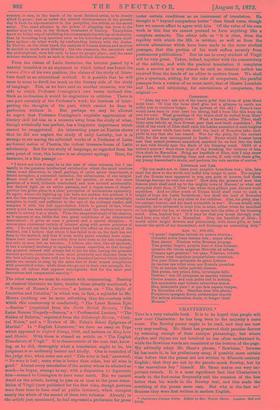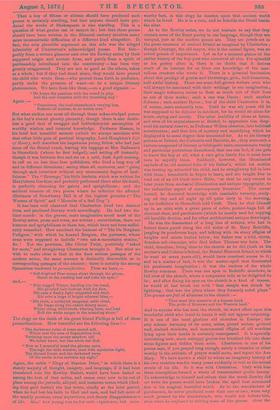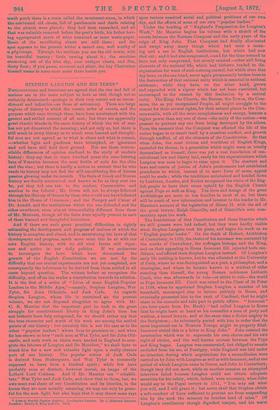CHATTERTON.*
Tins is a very valuable book. It is to be hoped that people will now read Chatterton : he has long been to the majority a mere name. The Rowley poems ought to be read, and they are now very easy reading. Mr. Skeat has preserved their peculiar flavour by retaining enough of their antique phraseology, but where rhythm and rhyme are not involved he has often modernised it, while the Rowleian words are translated at the bottom of the page. We advisedly adopt Mr. Skeat's phrase, " Rowleian," because he has made it, in his preliminary essay, if possible more certain than before that the poems are not written in fifteenth-century English ; that they are not by the pseudo-monk Rowley, but by " the marvellous boy " himself. Mr. Skeat makes one very im- portant remark. It is a most significant fact that Chatterton's words in the foot-notes frequently suit the scansion of the line better than his words in the Rowley text, and this made the rewriting of the poems more easy. But why is the fact so? Because they were first written in modern English.
• Chatterton's Poetical Works. Edited by Rev. Walter Skeat. London: Bell and Daldy.
That a boy of fifteen or sixteen should have produced such
poems is certainly startling, but that anyone should have pro- duced the works of Shakespeare is also startling. This is a question of what genius can or cannot do ; but that these poems
should have been written in the fifteenth century involves many more inconceivable difficulties of a different kind altogether. In fact, the only plausible argument on this side was the alleged inferiority of Chatterton's acknowledged poems. But this— partly from a certain glamour cast over the Rowley series by their supposed origin and archaic form, and partly from a spirit of partisanship introduced into the controversy—has been very greatly exaggerated. They are not so good as the others, taken as a whole; but if they had stood alone, they would have proved the child who wrote them—who poured them forth in profusion, partly under the pressure of want—to be a unique literary phenomenon. We have lines like these,—on a good organist :—
" He keeps the passions with the sound in play,
And the soul trembles with the trembling key."
Again :- "Conscience, the soul-chameleon's varying hue, Reflects all notions, to no notion true."
But what strikes one most all through these acknowledged poems is the boy's almost ghastly precocity, though there is also doubt- less a good deal of swagger and hobbedehoyish assumption of
worldly wisdom and immoral knowledge. Professor Masson, in his brief but beautiful memoir (which we always associate with that other little gem of poetical biography, Lord Houghton's Life of Keats), well describes the impetuous young fellow, who had just come off the Bristol coach, leaving his luggage at Mrs. Ballance's in Shoreditch (where he first lodged), and setting off instantly, though it was between five and six on a cold, dusk April evening, to call on no less than four publishers, who lived a long way off and in different directions ; seeing them all, moreover, and " going through each interview without any unnecessary degree of bash- fulness." The "Revenge," his little burletta which was written for Marylebone Gardens, and probably performed there after his death, is perfectly charming for gaiety and sprightliness ; and the satirical humour of two pieces where he ridicules the affected dilettante of Strawberry Hill is of the highest promise (" The Woman of Spirit" and " Memoirs of a Sad Dog").
It has been well observed that Chatterton lived two distinct lives, and produced literary work accordingly. He had two dis- tinct moods : in the graver, more imaginative mood most of the Rowley series, prose and verse, are written ; nevertheless, there are humour and sprightliness in them too, which have not been suffici- ently remarked. How excellent the humour of "The De Bergham Pedigree," with which he hoaxed Bergum, the pewterer, whose arms were supposed to include " two cat-a-mountains ermine," &c.! Yet the pewterer, like Oliver Twist, positively " asked for more," and straightway Chatterton brought it. But what we wish to make clear is that in the finer serious passages of the modern series, the same manner is distinctly discernible as in corresponding passages of the ancient ; there is notably the strong Spenserian tendency to personification. Thus we have,—
" Self-frighted Fear creeps silent through the gloom,
Starts at the rustling leaf and rolls his eyes ;"
and,—
"Pale rugged Winter, bending o'er his tread, His grizzled hair bedropt with icy dew, His eyes a dusky light congealed and dead,
His robe a tinge of bright ethereal blue,—
"His train, a motleyed, sanguine, sable cloud, He limps along the russet dreary moor, Whilst rising whirlwinds, blasting keen, and loud Roll the white surges to the sounding shore."
The elegy on the death of his great friend Phillips is full of these personifications. How beautiful are the following lines !-
"The darksome ruins of some sacred cell, Where erat the sons of Superstition trod, Tottering upon the mossy meadow, tell We better know, but less adore our Clod.
"Now as I mournful tread the gloomy nave, Through the wide window, once with mysteries dight, The distant forest, and the darkened wave Of the swoln Avon ravishes my sight."
Again, the noble "Elegy at Stanton Drew," in which there is a stately majesty of thought, imagery, and language, if it had been translated into the Rowley dialect, would have been hailed as among the best of that series, and seems even now to be out of place among the juvenile, alloyed, and insincere verses which (find-
ing they paid better) the boy wrote, chiefly at the later period, when he had lost his faith in God and man, and had felt more of the muddy passions, venal aspirations, and dreary disappointments of life. Alga! how young was be fur such txperience, but note- worthy fact, in this elegy he touches upon that ancient world which he loved. He is in a ruin, and he beholds the Druid beside the altar.
As to the Rowley series, we do not hesitate to say that they contain some of the finest poetry in our language, though they are unequal, just as the modern poems are. They are jewels set in the prose-romance of ancient Bristol as imagined by Chatterton ; though Canynge, the old mayor, who is the central figure, was an actual person of importance. Let ua for a moment glance at the earlier history of the boy-poet who conceived all this. For splendid as his poetry often is, there is no doubt that it derives much of its interest for us from our knowledge of the mar- vellous creature who wrote it. There is a personal fascination about this prodigy of genius and his strange, grim, half-humorous, half-awful history. There are some full-grown writers even who will always be associated with their writings in our imagination; their magic influence seems to flash as much out of their lives as out of their works ; such a one was Dante ; such another Johnson ; such another Byron ; but of the child Chattertou it is, of course, more eminently true. Until he was six years old he. was supposed to be deficient in intellect, for he would sit alone for hours, crying and moody. The utter inability of those at home,. and even of his acquaintances at Bristol, to appreciate him deep- ened his natural reserve, as Professor Wilson observes, into habitual secretiveness ; and that love of mystery and mystifying which he displayed is to some degree thus accounted for. As to his literary patrons at Bristol, the Caltcotta and Barrette, &c., they were such a curious compound of literary or bibliopolic taste, consummate vanity and particular portentous duneehood, that one can feel, if one gets to know the boy at all, what a rare grim lonely fun it must have been to mystify them. Suddenly, however, the illuminated capitals of an old musical folio of his father's, which his mother was tearing up, attracted the child, and he straightway fell in love with them ; henceforth he began to learn, and she taught him to read out of an old black-letter Bible, "so that he only turned in later years from mediaeval illumination and antique typography, to the unfamiliar aspect of contemporary literature." The corner turned, he devoured knowledge with insatiable voracity, study- ing all day and all night up till quite early in the morning, as his bedfellow in Shoreditch told Croft. Then he shut himself up in an attic with a great piece of ochre, pounce-bags full of charcoal-dust, and parchments (which he mostly used for copying old heraldic devices, and for other architectural antique drawings).
He was the descendant of a long line of sextons, who had in former times paced along the old aisles of St. Mary Redcliffe, jangling its ponderous keys, and talking with its stony effigies -of knights and saints buried below ; his father was a wild, clever,,
drunken sub-chaunter, who died before Thomas was born. The child, therefore, living close to the church as he did (both at his. mother's and Colston's School, the Bristol Bluecoat School, to which he went at seven years old), would have constant access to it;. and as a matter of fact, it was the master-spell that dominated, his passionate imagination ; it was the nucleus of the whole Rowley-romance. There was one spot in Redcliffe meadows, in full view of the church, where a companion tells us he delighted to lie ; and after fixing his eyes on the church in a kind of trance, he would at last break out with "that steeple was struck by lightning ; that was the place where they formerly acted plays.' The poems are lull of allusions to the church :— " Thou seest this maestri° of a human hand,
The pride of Briatowe and the Western land."
And to anyone who has seen the church, its weird effect upon this wonderful child who loved to haunt it will not appear surprising. It is one of the most glorious old churches in Europe ; the airy solemn harmony of its nave, aisles, piered arches, groined) roof, stained windows, and monumental effigies of old worthies- lying upon their tombs is certainly unsurpassed. It is specially interesting now, since unhappy genius has breathed life into these atone figures and bidden them arise. Chatterton in one of his
• says, if you prayed long enough, surely a crusader or other-
worthy in the attitude of prayer would move, and repeat the Ave- Mary. We have known a child to whom an imaginary history of his own creation was for many years evidently as real as the actual events of his life. So it was with Chatterton. Only with his► these conceptions formed a whole of transcendent poetic beauty. To acknowledge to himself and others that the monk Rowley did not write the poems would have broken the spell that entranced him in his magical beautiful world. As to the manufacture of parchments, he never produced more than one or two, when very much pressed by the dunderheads, who would not believe him, even when he confessed to writing wane of the poems. Over the
north porch there is a room called the muniment-room, in which the celebrated old chests, full of parchments and deeds relating to the church were placed; they had been ransacked, and all that was valuable removed before the poet's birth, his father hav- ing appropriated much of what remained as mere waste-paper. Some of the mouldering chests are still there ; and the spot appears to the present writer a sacred one, well worthy of -a pilgrimage. Through the mullions you see the old tower, with its beautiful tracery ; birds cawing about it ; the sunshine streaming out of the blue sky, over antique chests, and dim, dusty floor ; if you pause, reverent and silent, the boy Chatterton himself seems to muse mice more there beside you.




































 Previous page
Previous page